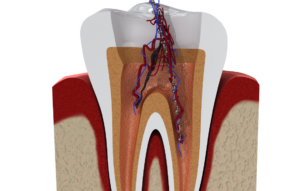Signs You Need a Root Canal Procedure
Is your tooth causing sleepless nights? Does the thought of a hot drink or cold dessert bring fear due to expected pain? These may signal an underlying dental issue—a call for a root canal. Ignoring symptoms can worsen conditions, leading to tooth loss. Learn clear signs for timely action to ease discomfort.
Persistent Tooth Pain: A Signal Not to Be Silenced
The most common and prominent symptom that points to a potential root of Persistent tooth pain from canal issues isn’t fleeting; it’s a nagging sensation impacting daily activities. This discomfort varies from dull aches to sharp jolts, prompting a dental visit when it escalates. Recognizing this pain as a call for help can expedite treatment.
Sensitivity to Hot or Cold – More than Just Winter Woes
Sensitivity to hot or cold foods can indicate tooth nerve vulnerability, potentially from infection or decay. While some sensitivity is typical, persistent discomfort warrants a dentist visit to discuss the root canal possibility.
Swollen Gums and Abscesses – The Body’s Fortress Breached
An abscess is a pus pocket at a tooth’s root tip, caused by bacterial infection in the root canal system. It leads to swelling, tenderness, and possible discharge. Swollen gums and abscesses signal severe infection. Untreated, it can spread to other body parts. A root canal can remove the infection source and restore oral health.
Darkening or Discoloration of the Tooth – A Visual Clue
Physical appearance can also reveal a lot about your tooth’s health. Darkening or discoloration of the tooth beyond normal yellowing can often signify that the tooth’s nerve tissue is damaged or dead. This color change is a result of the decayed material in the tooth pressing on the nerves, leading to their demise.
Discoloration might not always elicit pain or discomfort, but it is a serious issue that requires prompt attention. Ignoring a discolored tooth can lead to further complications and, in extreme cases, require extraction.
Prolonged Sensation After Hot or Cold – Lingering Discomfort
Does the twinge of discomfort continue well after the source of the hot or cold has been removed? This prolonged sensation is an indication that the tooth’s pulp is either inflamed or dead. It’s the body’s way of saying that something is majorly wrong inside your tooth’s inner workings and requires professional intervention.
The longer you wait to address this symptom, the more likely the issue will escalate, potentially leading to severe infection and supporting tooth structure damage. A root canal, in this case, can provide not just relief but also a means of saving your natural tooth.
Tooth Mobility – A Moving Tale of Decay
Teeth shouldn’t wiggle, even gently. Increased tooth mobility may signal weakened support structures due to decay or infection, affecting stability. Tooth mobility, with discomfort or pain, is a serious issue. It could make chewing and speaking harder and lead to awkward situations if a tooth moves unexpectedly.
Early Detection Is Key – A Root Canal Could Save the Day
The mention of a root canal can be scary, but modern techniques make it no more painful than a routine filling. By acting early, you can save your tooth from extraction and ease pain caused by infected pulp. The procedure removes the affected nerve and pulp, cleans the tooth interior, and seals it to prevent further infection.
Root Canal Treatment – A Light at the End of the Pain
Understanding the specifics of a root canal procedure can help demystify the process. Your dentist or endodontist will start by numbing the tooth, ensuring you’re comfortable throughout the treatment. They will then create an opening in the top portion of the tooth to access the pulp chamber.
The infected or damaged pulp is removed, and the canals are cleaned and shaped to be filled with a biocompatible material. The opening is sealed with a temporary or permanent filling, and a crown or restoration is often recommended to protect the tooth and restore it to full function.
Much like any other dental procedure, recovery varies from patient to patient. Following post-operative instructions, such as taking prescribed medications, avoiding chewing on the treated tooth, and maintaining good oral hygiene, are critical for a smooth recovery.
Recognizing signs like tooth pain, hot/cold sensitivity, or swelling is crucial to prevent serious dental issues. Understanding root canal benefits empowers proactive dental care for a healthy smile. Regular check-ups and good oral hygiene play a key role in avoiding painful procedures later.
If you have tooth pain, sensitivity, swollen gums, or tooth discoloration, consider a root canal at Plage Dentistry. Save your natural teeth and ease discomfort with our specialized treatment.
